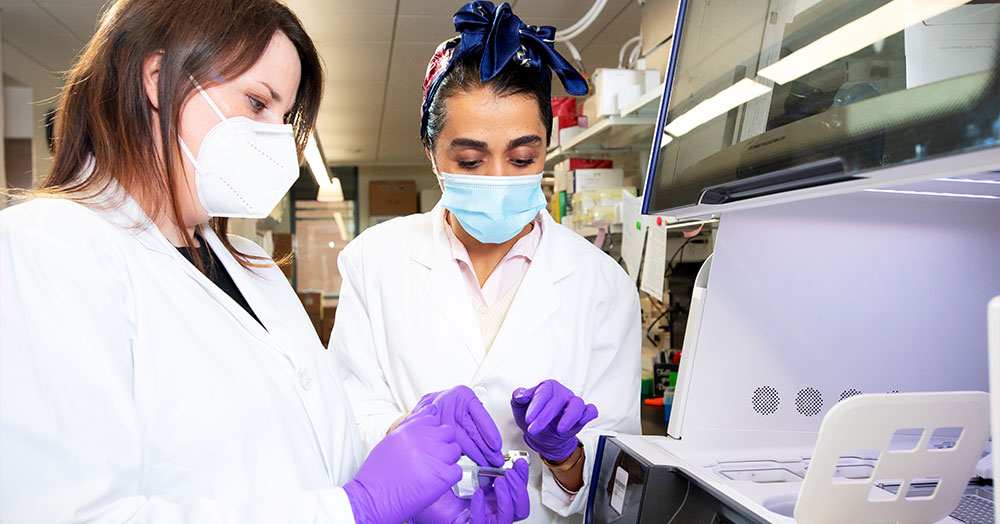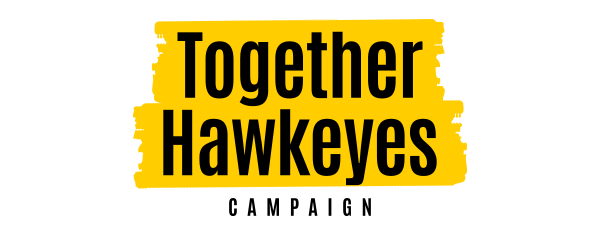Iowa Researcher Examines the Link Between Sleep and Neurodegeneration
 PHOTOS: JUSTIN TORNER/UI OFFICE OF STRATEGIC COMMUNICATION
In 2021, Iowa Neuroscience Institute scientist Marie Gaine works with graduate student Aysheh Alrfooh in a College of Pharmacy Building lab to study the DNA origins of psychiatric disorders.
PHOTOS: JUSTIN TORNER/UI OFFICE OF STRATEGIC COMMUNICATION
In 2021, Iowa Neuroscience Institute scientist Marie Gaine works with graduate student Aysheh Alrfooh in a College of Pharmacy Building lab to study the DNA origins of psychiatric disorders.
Iowa scientist Marie Gaine knows just how debilitating it can be to not get a good night’s sleep. Last year, Gaine and her husband welcomed their first child—and all the challenges that come with being new parents. After waking up every few hours with their newborn, Gaine remembers how much of a struggle it was to function the next day.
“I was extremely sleep-deprived for a long time,” Gaine says. “Sometimes I couldn’t even form words.”
The cognitive effects of poor sleep came as no surprise to Gaine, an assistant professor in the UI College of Pharmacy and member of the Iowa Neuroscience Institute. Her lab inside the new UI Pharmacy Building investigates how genetic and environmental factors contribute to neurodegenerative and psychiatric disease, including the link between sleep deprivation and neurodegeneration.
 Iowa researcher Marie Gaine
Iowa researcher Marie Gaine
Sleep is a crucial part of a healthy lifestyle. But according to the Centers for Disease Control and Prevention, one-third of adults in the U.S. report not getting enough rest. Poor sleep can lead to a host of health problems, and the brain is among the organs most affected. Not getting the recommended minimum of seven hours of sleep per night for adults can make you more forgetful, less able to concentrate, and more accident prone. Even more concerning, sleep disorders have been linked to neurodegenerative diseases such as Alzheimer’s and Parkinson’s.
Gaine’s lab works to understand the role of epigenetics—how environmental factors can alter our DNA—in the development and treatment of psychiatric disorders. In today’s age of long workdays and attention-trapping technology, chronically restricted sleep is among the most prevalent environmental factors detrimental to our health.
“The main reason that we’re interested in this is because sleep disturbance is a major factor for individuals with neurodegeneration,” says Gaine. “One of the first symptoms—before the more common ones like memory loss and cognitive deficits—can be disrupted sleep. It’s common for somebody with neurodegenerative phenotype or disorder to also be sleep-deprived.”
Working in collaboration with Iowa Neuroscience Institute Director Ted Abel, Gaine explores how sleep deprivation can worsen learning, memory, and anxiety in mouse models genetically predisposed to neurodegeneration. She was first author of a 2021 study that pinpointed how keeping mice awake deregulated their gene expression in the hippocampus, an area of the brain that’s important for learning and memory.
Earlier this year, the Iowa Neuroscience Institute awarded Gaine a Williams-Cannon Fellowship, which provides funding annually for neurodegeneration research. The fellowship was established by INI supporters Sue (69BBA) and Frank Cannon in honor of their loved ones affected by neurodegenerative disease. Gaine, an Ireland native who came to Iowa in 2012 as a postdoctoral researcher before founding her lab three years ago, says such funding is vital for early-stage investigators like her.
“As I’m trying to ramp up and get federal funding, like grants from the NIH, this kind of fellowship really gives me a bump and allows me to get the preliminary data that’s necessary to get that larger funding,” says Gaine. “This type of support is critical for any lab.”


